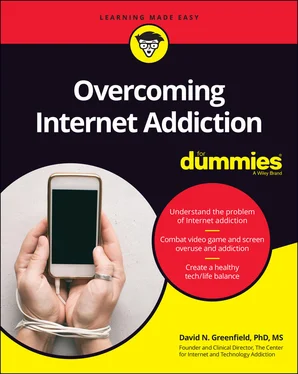1 ...6 7 8 10 11 12 ...24
Getting professional help
Sometimes self-help and support groups aren’t enough to make the changes you need in your life. Breaking an addiction can be hard, and any behavior change can sometimes be made easier with professional help. My recommendation would be to find a psychologist, psychiatrist, or therapist who has experience in addiction and addiction medicine, preferably with a background in Internet, video game, or screen addiction. Don’t be afraid to ask questions regarding their experience (and expertise) in this area, and be wary of any doctor or therapist who underplays the issue and tells you it isn’t a real problem.
 For the last 20 years, I supervised psychiatry residents and taught courses on Internet addiction and sexual medicine at the University of Connecticut School of Medicine in the Department of Psychiatry. I have trained many doctors and therapists on how to treat this issue, so please make sure you find someone who has had some training and/or experience in this specialty area. See Chapter 13for more about finding professional help.
For the last 20 years, I supervised psychiatry residents and taught courses on Internet addiction and sexual medicine at the University of Connecticut School of Medicine in the Department of Psychiatry. I have trained many doctors and therapists on how to treat this issue, so please make sure you find someone who has had some training and/or experience in this specialty area. See Chapter 13for more about finding professional help.
Raising Tech-Healthy Children
At least two generations have now been raised on Internet and screen technologies. I wish I could unequivocally say that this been a good thing. The Internet and digital screens are unquestionably a great innovation and have changed the world in many positive ways, but there have been some negative changes as well. There are clear brain and behavioral changes from excessive screen use. It seems the Internet can change the way you think, or at times make thinking less important. It also impacts your ability to delay gratification and may impact social and empathy development, and there is growing evidence to suggest that today’s youth have developed mental health problems from excessive smartphone, screen, and social media use.
However, perhaps the biggest issue with children and teens is the incredible amount of time they spend on their devices and the way it impacts their real-time social interactions, physical activity, and relationships. This life imbalance is palpable and can cause real issues in overall health and well-being. This is not to say that everyone who uses Internet and screen technologies needs treatment or even has a problem, but some of the data is certainly a cause for concern.
 The goal is to teach children responsible and sustainable use of technology and how to use their screens in limited and balanced ways. See Chapter 15for more information.
The goal is to teach children responsible and sustainable use of technology and how to use their screens in limited and balanced ways. See Chapter 15for more information.
Balancing Technology with Real-Time Living
Anything in excess can produce negative health issues, and the Internet and screen technologies are no exception. Health issues relating to screen use have been well established and may involve reduced and poor sleep, increased stress and elevated cortisol, repetitive motion injury, and neck and back problems. There have been reports of thumb, finger, and upper-back problems from excessive screen use, as well as eye strain and difficulties focusing. Some reports of more serious medical issues include elevated blood pressure, blood clots, weight gain from sedentary behavior, and heart rate issues from dehydration; in extreme cases, people have died.
Health is in large part determined by balance in your life; screens and all the content you endlessly consume online may interfere with that balance. But balance is key. It can be hard to maintain because it involves conscious choices, but it is necessary for healthy living. After treating hundreds of patients with Internet and video game use issues and having used the technology myself for the last 30 years, I have come to believe that it is anything but benign. It eats up your attention and can rob you of the most important resource in your life — your time — without your even knowing it.
People constantly embrace new technology: faster smartphones (companies are now rolling out 5G), faster processors, bigger and better screens, more apps, and more devices connected to the cloud and running their daily lives. This in some ways represents progress, but in many ways, it is a setback. All this technology requires more and more time and attention to manage, maintain, and learn how to use. I cannot tell you how many times I have had to troubleshoot a problem with some digital device, install a new app, or just change my password for the millionth time. All of this takes time. All of this takes energy. All of this takes attention from other, perhaps more meaningful and satisfying parts of your life. All of this attention to our tech adds up.
 Sure, all this convenience is wonderful, but is it really making life happier and satisfying? I’m not so sure. Has all your screen and Internet use really added quality to your life? Just because you can hook everything in your life up to the Internet does not literally mean it will improve the quality of your life; you always must ask yourself the question “Will the cost (time) really be worth the ultimate benefit? ”
Sure, all this convenience is wonderful, but is it really making life happier and satisfying? I’m not so sure. Has all your screen and Internet use really added quality to your life? Just because you can hook everything in your life up to the Internet does not literally mean it will improve the quality of your life; you always must ask yourself the question “Will the cost (time) really be worth the ultimate benefit? ”
Chapter 14has details on finding balance in screen use. Chapter 16warns you of how the Internet is only going to become more addictive.
Understanding the End of Privacy as You Knew It
The following sections cover a few of the features of the Internet that many of you may experience as inherent strengths of being online, but many are an illusion when looked at more closely.
Recognizing the myth of anonymity on the Internet
Anonymity is a myth on the Internet as there is no such thing as real privacy online. When we conducted our original research in the late 1990s, several items stood out. Not surprisingly, perceived anonymity was a significant factor in contributing to the appeal of the Internet. It seems there was a perception that the Internet and all things communicated online felt like they were anonymous. But nothing could be further from the truth.
Virtually everything you do and say, type, text, post, search, and scroll online is trackable, traceable, and in some cases recorded and reproducible. That is not to say that everyone is reading and listening to what you do online, but rather to demonstrate that there is a footprint of what you do and say online. In general, you should remember that online communications are anything but anonymous. There are countless cases where users are startled to find out that what they do and say online can be accessed by others, and this record appears to be rather permanent. All this is said not to make you paranoid, but rather to be mindful that privacy online is complicated and it’s best to remember that.
 Nothing online, and I mean nothing, is private.
Nothing online, and I mean nothing, is private.
Understanding the disinhibition phenomenon
Another important phenomenon is disinhibition. We do not entirely know why people often feel disinhibited or freer to express thoughts and feelings online. Sometimes that can be a good thing, but at times you can say things that might be better left unsaid. When on social media or other communication apps, it’s important to remember that the act of communicating online via text seems to bypass some neurological processing that might act as a buffer in verbal interactions; this may be due to differences in processing and less use of the frontal part of the brain that manages impulsivity, although this has not been formally established.
Читать дальше

 For the last 20 years, I supervised psychiatry residents and taught courses on Internet addiction and sexual medicine at the University of Connecticut School of Medicine in the Department of Psychiatry. I have trained many doctors and therapists on how to treat this issue, so please make sure you find someone who has had some training and/or experience in this specialty area. See Chapter 13for more about finding professional help.
For the last 20 years, I supervised psychiatry residents and taught courses on Internet addiction and sexual medicine at the University of Connecticut School of Medicine in the Department of Psychiatry. I have trained many doctors and therapists on how to treat this issue, so please make sure you find someone who has had some training and/or experience in this specialty area. See Chapter 13for more about finding professional help.










